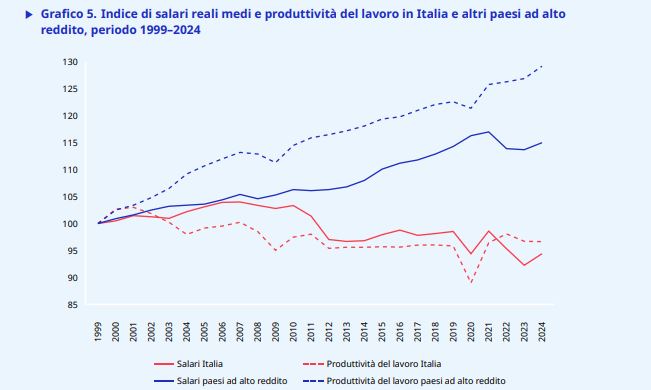Royal wages, none worse than Italy: compared to 2008 lost 8.7% of purchasing power (and in Germany it has risen by 15%)

The data in the Oil report. Among the countries of the G20 negative record of our country: in France, in the same period, there was an increase of about 5%, in Germany by almost 15%
Italy is the G20 country where wages have undergone the strongest loss of purchasing power from 2008 to today: -8.7%. In France, in the same period, there was an increase of about 5%, in Germany by almost 15%. These are the data contained in the focus on the Italy of the world report on wages 2025-26, of the Oil (Here the link to the relationship), International work organization.
In the last three years, after a drop in real wages of 3.3% in 2022 and 3.2% in 2023, in 2024 there was however an increase of 2.3%, however insufficient to recover the loss of land compared to inflation, which in 2022 had reached the peak of 8.7%.
Precisely the inflation, which penalizes the lower wages more, has had a weight in determining The bad performance of wages in Italytogether with a series of structural factors, starting with the nanism of the production structure, from low productivity, in particular in the services, of poor investments in technological innovation and workers’ training.
Insufficient contracts: productivity grows, wages no
However, Oil observes in the last two years Productivity has grown more than wages and therefore, in theory, there would be a space to raise wages. The fact is, the researchers underline, which, despite the spread of national work contracts, which in Italy cover almost all of the workers, the renewal of the same has not proven, in the average, capable of maintaining wages at least in line with the increase in prices. This also happened because The model of the bargain itself appears inadequate: On the one hand, taking as a reference an inflation index, the IPCA, net of the prices of imported energy goods, does not cover one of the items that have burdened more on family budgets, and on the other, normally demanding the distribution of productivity gains to corporate contracts, this possibility only offers a minority of workers, generally those of large companies.
Strong inequalities between workers
The picture is completed, a situation of strong inequalities between Italian and foreign workers, with the latter relegates to the less paid activities, so much so that their median wage is 26% lower than that of the Italians who do the same work; between women and men, with the first ones who have clearly lower income from work, also because they are forced much more frequently to part time; And between young and old, with the first ones who, especially if with a high qualification, receive average salaries decidedly lower than those that would take in other advanced countries. In short, a complex situation that comes from afar and with respect to which the responses of the actors on the field, government, businesses and unions, appear insufficient.





:format(webp)/s3/static.nrc.nl/wp-content/uploads/2025/06/05163439/data133217982-f902a2.jpg)

